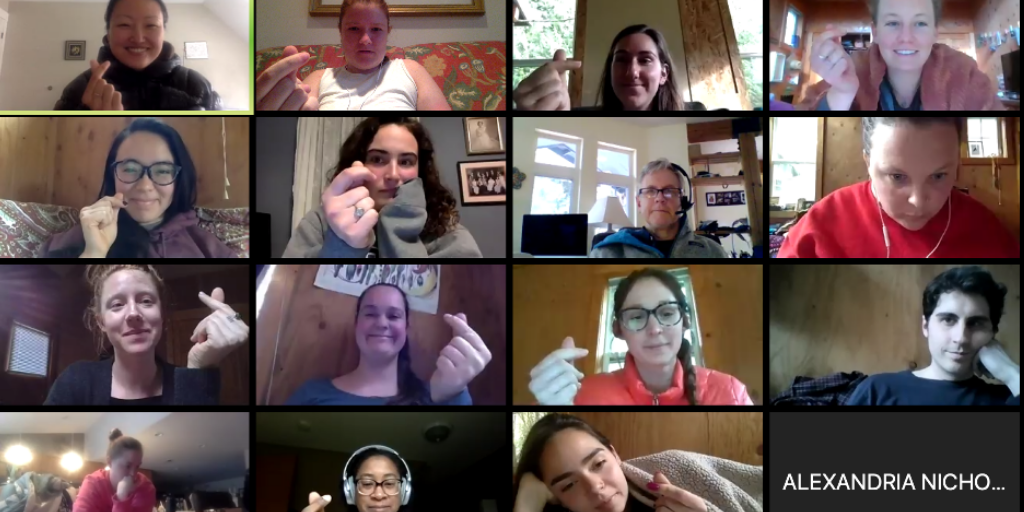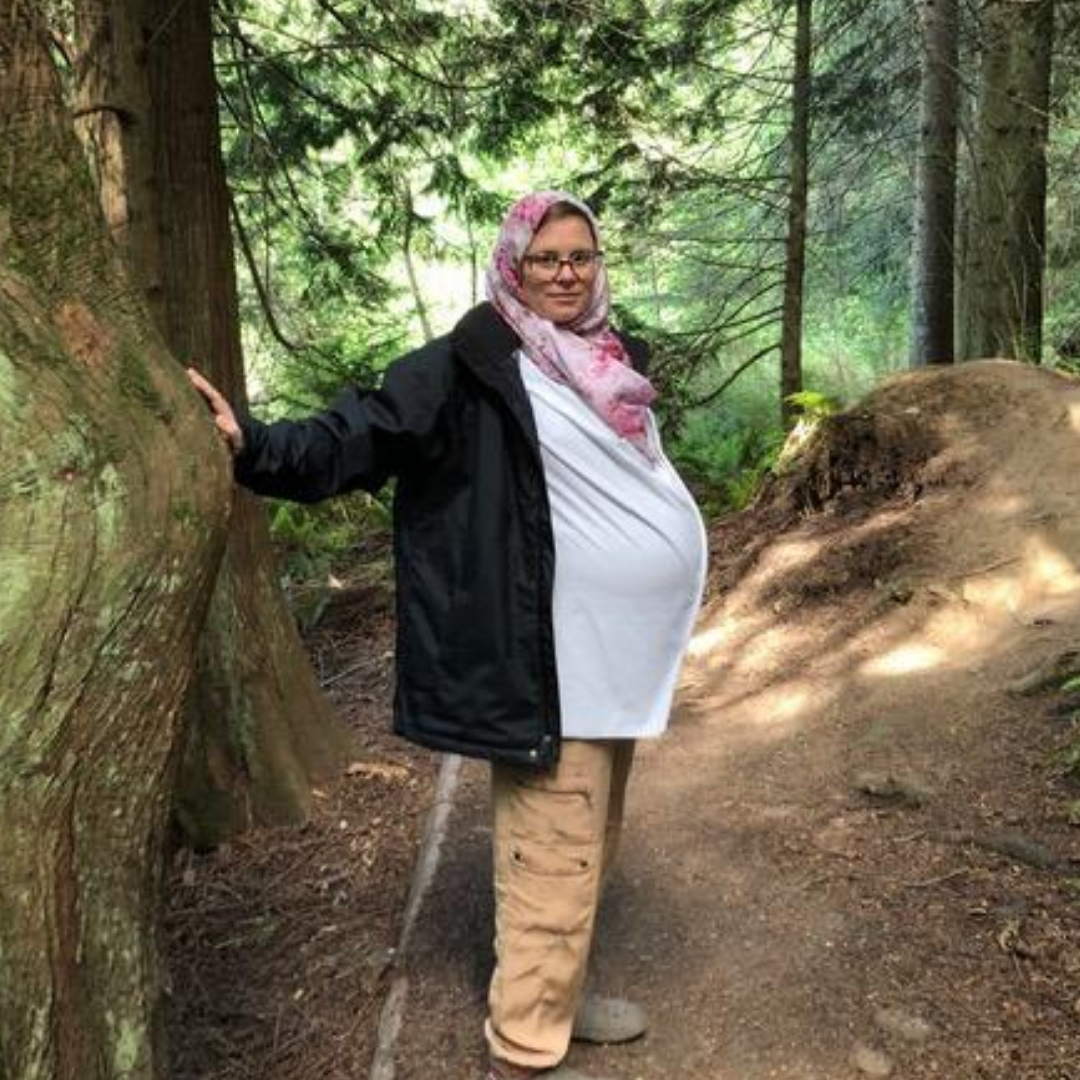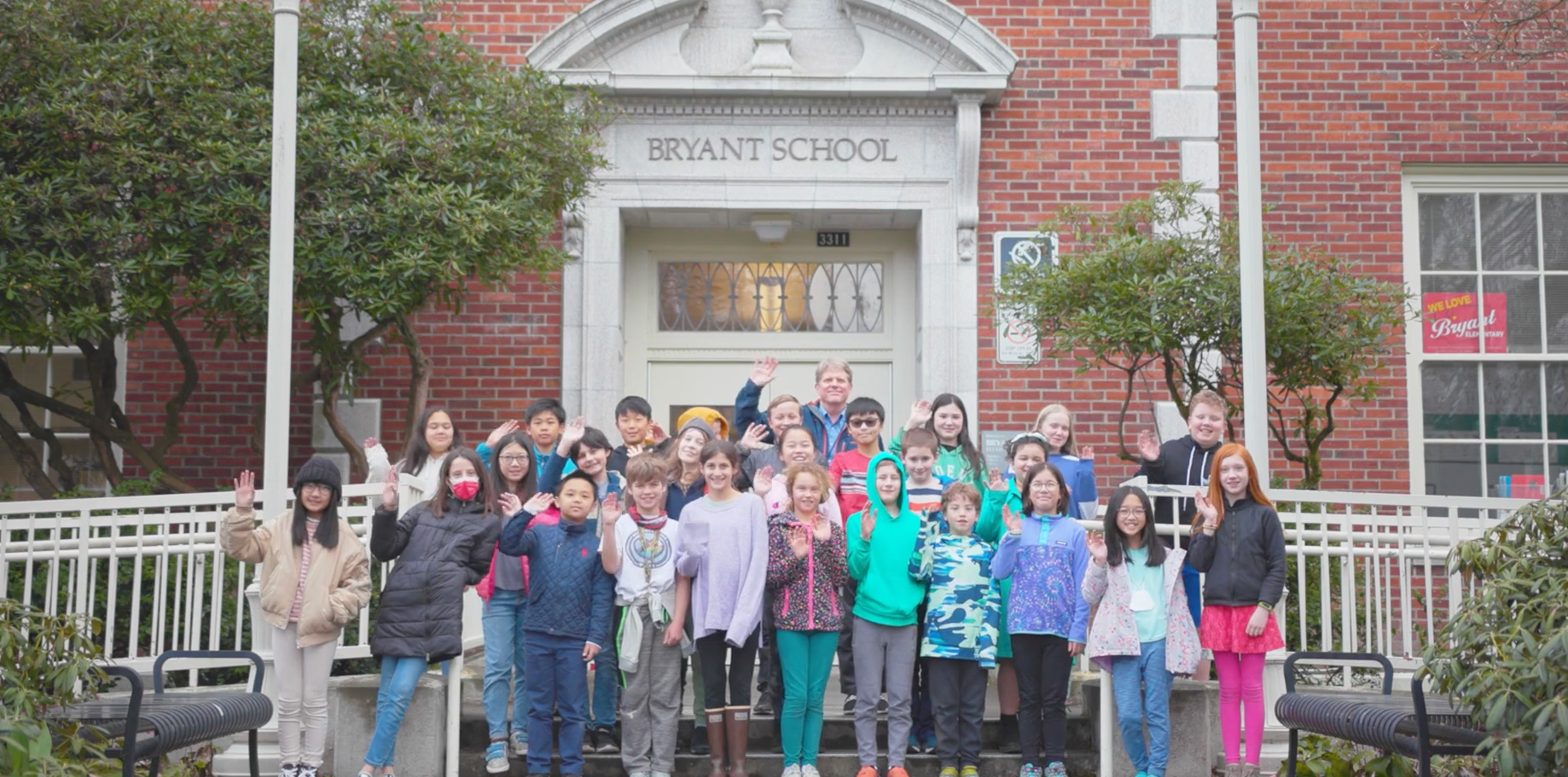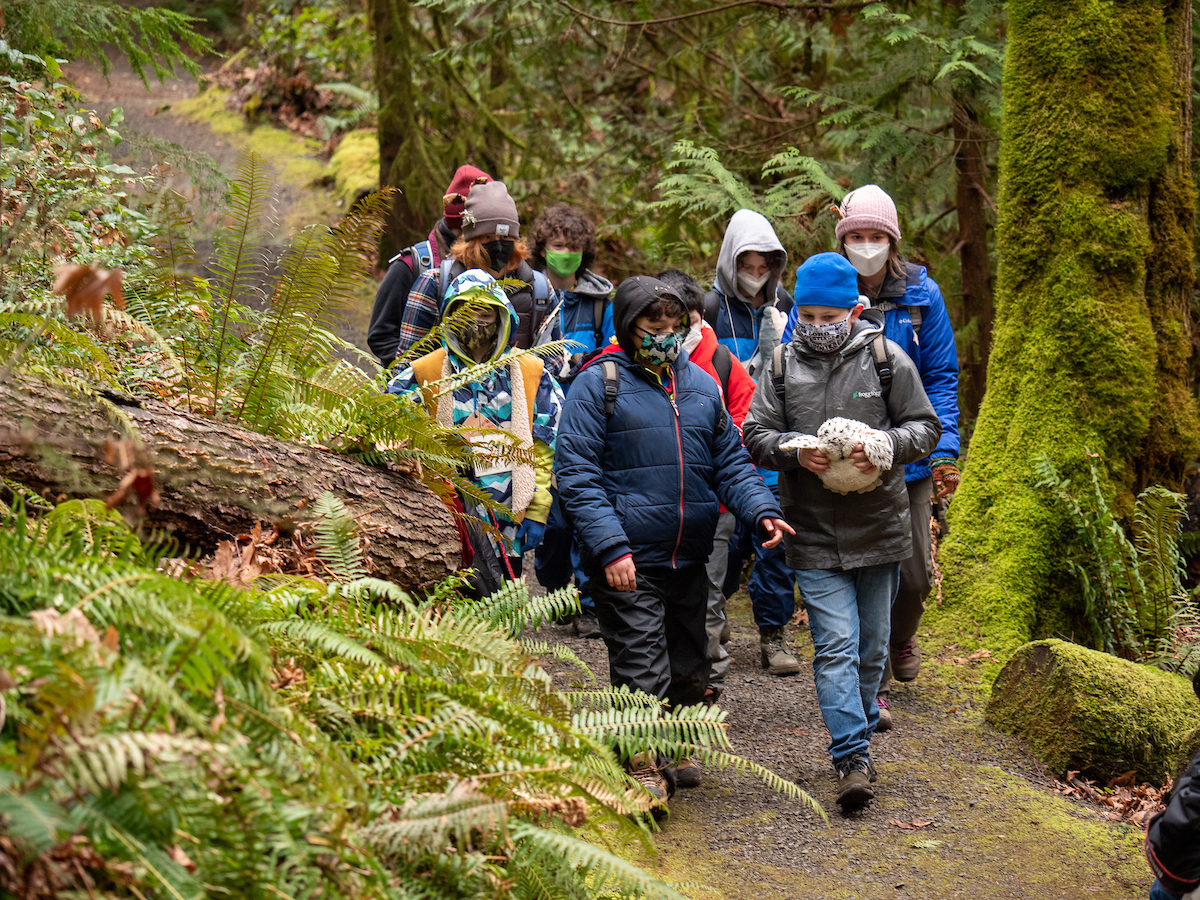Morgan Lindberg (‘15) is handling teaching in the time of the coronavirus with relative ease.
When the IslandWood graduate program moved online with the arrival COVID-19, faculty transitioned from teaching around a table or out on the trails to teaching by computer. For graduate faculty member Jenny Cunningham, M.Ed., M.i.T., who sees side conversations among her students as evidence of collaborative learning and irrepressible interest, the Zoom classroom can be unsettlingly quiet. There is no whispering, no testing out ideas or offering to help, not when one student may be on campus and the other in the Colorado living room of her parents. Director of Campus Education Programs, Déana Scipio, Ph.D., refers to this audible classroom energy as “buzz.” It lets her know when a task has been well timed and students are engaged
![[Image description: IslandWood faculty member Jenny Cunningham, M.Ed. and M.i.T., center, surrounded by the EEC graduates during orientation earlier in the year]](https://islandwood.org/wp-content/uploads/2020/06/IMG_7155-300x200.jpg)
IslandWood faculty member Jenny Cunningham, M.Ed. and M.i.T., center, surrounded by the EEC graduates during orientation earlier in the year.
Jenny and Déana, who are themselves alumni of IslandWood’s graduate program, teach teaching. They know that how they teach is almost as important as what they teach. And they have the skill and sensitivity to work toward recreating, as much as possible, the intimate give-and-take between teacher and students. Even under these exceptional circumstances, they did not resort to simply transferring information lecture-style, but insisted on guiding students toward understanding through discussion, experimentation, and practice.
Jenny, who teaches a course on elementary school math methods, is regularly praised by students for her interactive, hands-on approach. None of this has changed. This past quarter grads studied pattern and ratios with the geometrical drawing device Spirograph, viewing Jenny’s demonstrations via Zoom and working with a digital version found online. In another session, they paired up in Zoom breakout rooms to teach one another an intricate environmental education lesson that illustrates fractions within the context of sustainability and takes practice to master. Sections of an apple, representing Earth, are cut away, beginning with the three quarters of its surface that is covered by ocean and continuing until all that remains is the thin sliver of apple signifying the 1/32nd of the Earth that produces all the world’s food.
Like Jenny, Déana relied on breakout rooms. With in-person teaching she would say, “Turn to your partner,” but online she decides room assignments in advance and prepares a Google Doc with prompts to guide small-group discussion and space for students to share their ideas. “I have always felt that jazz and teaching had a lot in common because they are so improvisational,” said Déana. “Now I would use a different analogy. When cooking, you smell the various ingredients and put them together in a way that makes sense as you go. With baking, however, you decide on your ingredients beforehand, because it’s a chemical reaction you’re looking for. I find myself needing to be more precise when teaching online. I’ve got to think through everything I need prior to launching into a set of conversations with the students.”
![[image description: Director of Campus Education Programs, Déana Scipio, PhD, with the graduates earlier in the year.]](https://islandwood.org/wp-content/uploads/2020/06/IMG_7240-300x224.jpg)
Director of Campus Education Programs, Déana Scipio, PhD, teaching in the classroom with the graduates earlier in the year.
Our School Overnight Program (SOP) for 4th – 6th graders, which serves as the graduate student practicum, has been temporarily suspended in light of COVID, a loss the grads felt deeply. But forgoing a teaching practicum was never an option for a program that prepares experiential educators. The grads were all engaged in STEM-based applied learning projects that serve new audiences in a new time and demand new skills. Grads contributed to IslandWood’s work for ClimeTime, the state-funded teacher training initiative in climate science. At a recent virtual ClimeTime conference, four students conducted a workshop for teachers, sharing garden-based lessons that built from their work in SOP. There were thirty-six participants and a waiting list of 40, prompting a second workshop later in the spring.
Graduate student Allison Dumas created an instructional video for parents who are homeschooling their children in science. She once found it uncomfortable to be recorded while teaching, a standard practice in the program, and now found herself performing naturally for an imaginary audience. Emily Morgan, who like Allison hopes to direct a program like SOP, built her project off IslandWood’s Nature Passport app, an interactive compendium of activities for families to explore and learn outdoors. She created a video for parents, integrating live-action video with images from the app. Allison, Emily, and their fellow grads mastered new tools and learning to engage with an audience virtually, skills that are likely to be increasingly valuable in the context of COVID.
IslandWood is planning for the continuation of SOP in its traditional form beginning February, but we are also developing SOP-style day programming onsite and off, online and off, and for a bigger age range that would comply with shifting school policy and the unique needs of students following this period of homeschooling. Next year’s grads will teach in these programs.
The students’ sense of accountability to one another and the faculty also fueled the successful transition online. Emily was motivated “to honor these professors that we have a relationship with and that we know have put their heart and soul into teaching us” and appreciated that faculty were available by phone and text. “They recognized that we lost those little interactions that we would get around IslandWood, whether it was out in the field with kids or around campus, where you’d have quick conversations about class or just about life,” she noted. “I think the program as a whole and especially our professors put in that time to make us feel that connection still. That was something I was most worried about losing.”
Déana acknowledges that IslandWood was in an enviable position when COVID hit. Unlike many institutions which were beginning a new quarter with classes of new students, we had relationships with our grads dating back to the fall and were able to redesign the program to match their needs and resources. “We are experiencing physical distancing,” she said, “but ‘social distancing’ is not a great term to describe what’s going on. We are leveraging the tools of technology to create social connectivity.”
Those relationships with students were not happenstance, but rather, the expression of intentional efforts to build community. Much has changed, but this commitment to community and to applied learning and interactive, hands-on teaching will continue –regardless of a global pandemic.










